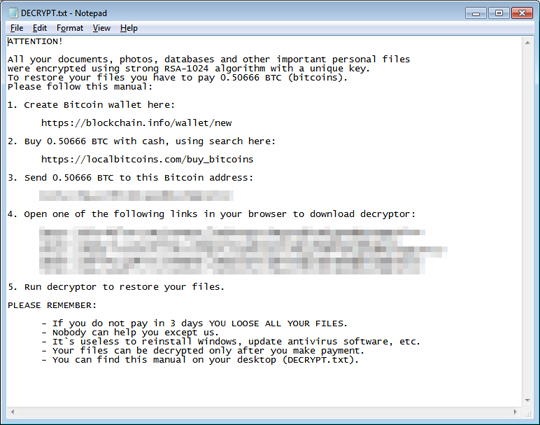RANSOM_XORBAT.A
Trojan-Ransom.BAT.Agent.ay (Kaspersky)
Windows


Threat Type: Trojan
Destructiveness: No
Encrypted: No
In the wild: Yes
OVERVIEW
This Trojan arrives as an attachment to email messages spammed by other malware/grayware or malicious users.
TECHNICAL DETAILS
Arrival Details
This Trojan arrives as an attachment to email messages spammed by other malware/grayware or malicious users.
Installation
This Trojan drops the following files:
- %Desktop%\DECRYPT.txt - ransom note
- %User Temp%\809133.txt - ransom note
- %User Temp%\809133.cmd - uses 809133.exe to encrypt files. This is deleted after file encryption
(Note: %Desktop% is the desktop folder, where it usually is C:\Documents and Settings\{user name}\Desktop in Windows 2000, Windows Server 2003, and Windows XP (32- and 64-bit); C:\Users\{user name}\Desktop in Windows Vista (32- and 64-bit), Windows 7 (32- and 64-bit), Windows 8 (32- and 64-bit), Windows 8.1 (32- and 64-bit), Windows Server 2008, and Windows Server 2012.. %User Temp% is the user's temporary folder, where it usually is C:\Documents and Settings\{user name}\Local Settings\Temp on Windows 2000, Windows Server 2003, and Windows XP (32- and 64-bit); C:\Users\{user name}\AppData\Local\Temp on Windows Vista (32- and 64-bit), Windows 7 (32- and 64-bit), Windows 8 (32- and 64-bit), Windows 8.1 (32- and 64-bit), Windows Server 2008, and Windows Server 2012.)
Other System Modifications
This Trojan adds the following registry entries as part of its installation routine:
HKEY_LOCAL_MACHINE\SOFTWARE\Classes\
.crypted
(Default) = "Crypted"
HKEY_LOCAL_MACHINE\SOFTWARE\Classes\
Crypted\shell\open\
command
(Default) = "notepad.exe %User Temp%\809133.txt"
Other Details
This Trojan encrypts files with the following extensions:
- *.zip
- *.rar
- *.7z
- *.tar
- *.gz
- *.xls
- *.xlsx
- *.doc
- *.docx
- *.rtf
- *.ppt
- *.pptx
- *.sxi
- *.odm
- *.odt
- *.mpp
- *.ssh
- *.pub
- *.gpg
- *.pgp
- *.kdb
- *.kdbx
- *.als
- *.aup
- *.cpr
- *.npr
- *.cpp
- *.bas
- *.asm
- *.cs
- *.php
- *.pas
- *.vb
- *.vcproj
- *.vbproj
- *.mdb
- *.accdb
- *.mdf
- *.odb
- *.wdb
- *.csv
- *.tsv
- *.psd
- *.eps
- *.cdr
- *.cpt
- *.indd
- *.dwg
- *.max
- *.skp
- *.scad
- *.cad
- *.3ds
- *.blend
- *.lwo
- *.lws
- *.mb
- *.slddrw
- *.sldasm
- *.sldprt
- *.u3d
- *.jpg
- *.tiff
- *.tif
- *.raw
- *.avi
- *.mpg
- *.mp4
- *.m4v
- *.mpeg
- *.mpe
- *.wmf
- *.wmv
- *.veg
- *.vdi
- *.vmdk
- *.vhd
- *.dsk
It does the following:
- It accesses the following URLs to report infection status and to download component for encryption routine:
- http://{domain}/counter/?ad=1DJSvvJhEaJvHfFxBiqoUdM4LPQQFs4iDJ&dc={value}
- http://{domain}/counter/?id=rXf99xSu-CaXHM9gcc0cQ9m_ZAqPxVR6ffAJEPT3ntMUCmaFwrCfyZQGeh2b8fy-ZX23_9Am&rnd={random generated number}
where {domain} can be any of the following:
- {BLOCKED}ilen.com
- {BLOCKED}r.ru
- {BLOCKED}esearch.com
- {BLOCKED}s.com.tr
- www.{BLOCKED}n.ro
- The downloaded file is saved as follows:
- %User Temp%\809133.exe - component for file encryption. This is deleted after file encryption routine
- It appends the extension .crypted to the encrypted files
NOTES:
This malware opens the dropped ransom note 809133.txt containing the following message:

SOLUTION
Step 1
Before doing any scans, Windows XP, Windows Vista, and Windows 7 users must disable System Restore to allow full scanning of their computers.
Step 2
Note that not all files, folders, and registry keys and entries are installed on your computer during this malware's/spyware's/grayware's execution. This may be due to incomplete installation or other operating system conditions. If you do not find the same files/folders/registry information, please proceed to the next step.
Step 3
Delete this registry key
Important: Editing the Windows Registry incorrectly can lead to irreversible system malfunction. Please do this step only if you know how or you can ask assistance from your system administrator. Else, check this Microsoft article first before modifying your computer's registry.
- In HKEY_LOCAL_MACHINE\SOFTWARE\Classes
- .crypted
- .crypted
Step 4
Delete this registry value
Important: Editing the Windows Registry incorrectly can lead to irreversible system malfunction. Please do this step only if you know how or you can ask assistance from your system administrator. Else, check this Microsoft article first before modifying your computer's registry.
- In HKEY_LOCAL_MACHINE\SOFTWARE\Classes\Crypted\shell\open\command
- (Default) = "notepad.exe %User Temp%\809133.txt"
- (Default) = "notepad.exe %User Temp%\809133.txt"
Step 5
Search and delete this file
- %Desktop%\DECRYPT.txt
- %User Temp%\809133.txt
- %User Temp%\809133.exe
- %User Temp%\809133.cmd
Step 6
Scan your computer with your Trend Micro product to delete files detected as RANSOM_XORBAT.A. If the detected files have already been cleaned, deleted, or quarantined by your Trend Micro product, no further step is required. You may opt to simply delete the quarantined files. Please check this Knowledge Base page for more information.
Step 7
Restore encrypted files from backup.
Did this description help? Tell us how we did.


